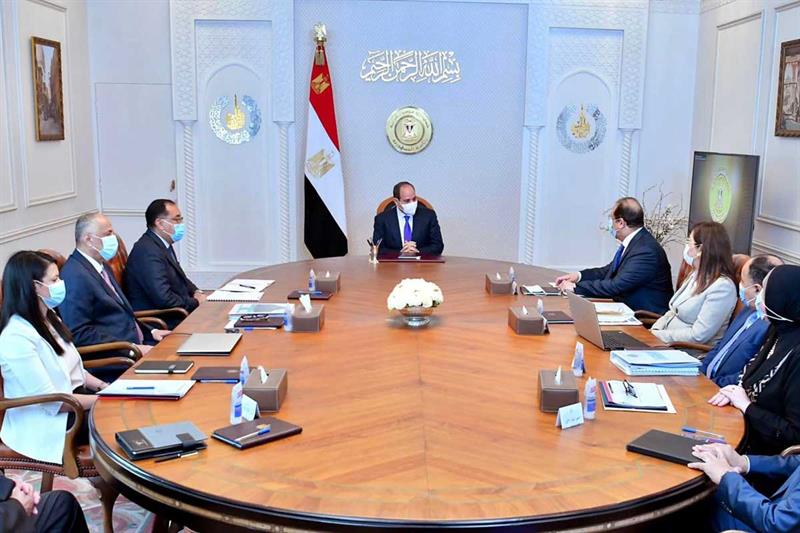
Egyptian President Abdel-Fattah El-Sisi holds a meeting with the Ministerial Economic Group, 4 July 2022. Egyptian Presidency
El-Sisi made his remarks during a meeting with the Ministerial Economic Group to follow up on the finance ministry’s plan to reduce the public debt of the state’s general budget agencies in the coming period, Presidential Spokesperson Bassam Rady said in a statement.
In this regard, the president urged reducing the debt-to-GDP ratio, maintaining the state’s public finance performance discipline, and continuing to foster investment to maximise production and secure job opportunities.
Moreover, the president urged the continuation of spending on health and education programmes.
The meeting also reviewed the state’s financial performance indicators in FY2022/21, according to Rady.
Revenues and expenditures grew by 20 percent and 15 percent respectively, according to preliminary data of that year’s general budget performance.
Also, Egypt achieved during the past FY an initial surplus worth EGP 97 billion with a 1.3 percent of initial surplus to GDP ratio.
Thus, the state’s general budget has achieved a primary surplus for the fourth year in a row.
Additionally, the state reduced the total deficit and value of the debt service bill to 6.1 percent and 32.8 percent, down from the 6.8 percent and 35.8 percent recorded in the previous FY.
Prime Minister Mostafa Madbouly, Governor of the Central Bank of Egypt (CBE) Tarek Amer, and Chief of the General Intelligence Service (GIS) Abbas Kamel also attended the meeting.
Attendees also included Minister of Planning and Economic Development Hala El-Said, Minister of International Cooperation Rania Al-Mashat, Minister of Finance Mohamed Maait, Minister of the Public Business Sector Hisham Tawfik, and Minister of Trade and Industry Nevine Gamea.
The president is set to ratify into law the FY2022/23 budget that was approved by the House of Representatives on 21 June and will go into effect in July.
The new budget targets EGP 2.071 trillion in expenditures and EGP 1.518 trillion in revenues, according to Maait, which means a budget deficit of EGP 553 billion, up from EGP 475 billion in FY2021/22.
Maait indicated that the budget also targets tax receipts of EGP 1.2 trillion, “however, net borrowing is expected to reach EGP 558 billion in the new budget, while we will be required to pay EGP 965.4 billion in settlement of debts during the coming FY, which will begin on the first of July.”
“Fuel subsidies will be increased from EGP 18.4 billion to EGP 28.9 billion, while food subsidies — which cover bread and basic commodities for 71 million citizens holding ration cards — will climb from EGP 87.2 billion to EGP 90 billion,” he added.
Maait also noted that despite the global economic crisis that has been triggered by the war in Ukraine, the budget targets more spending on subsidies and social safety net programmes.
In its Global Economic Prospects report last month, the World Bank said the Egyptian economy is expected to record a 4.8 percent growth in FY2022/23. This represents a 0.7 percentage point downgrade from the previous 5.5 percent projection due to a decline in tourism resulting from the Ukrainian war and the rise of food and energy prices.
Furthermore, global inflationary pressures caused by the COVID-19 pandemic and the recent Russian-Ukrainian War have caused the CBE to raise the key interest rates in March by one percent for the first time since 2017 and again by 2 percent in May before maintaining them in June for the first time since the war broke out in February.
Short link: